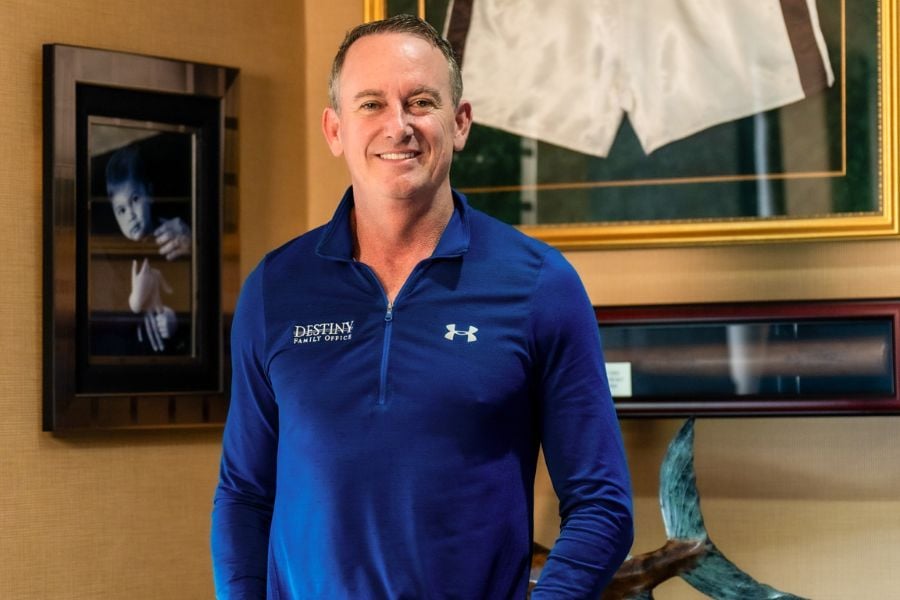

Three years ago, Thomas Ruggie was reviewing his legal documents as part of his general estate planning – and he found a problem.
"I'd built up a significant collection that my family knows nothing about," said Ruggie, founder and CEO of Destiny Family Office. "I don't have it well documented. I don't have it well insured. And if I get into a car accident on the way home tonight, there's no way my family's going to monetize what I have."
At that point, Ruggie had spent roughly half a decade building up his multifamily office practice. And as a collector among collectors – aside from his nationally recognized set of more than 400 signed Topps cards authenticatd by the PSA, Ruggie has owns dozens of sports-related original art pieces, as well as vintage sports memorabilia – he realized he couldn't be the only one faced with a planning gap.
"I went on this mission, knowing what I know because of my background and the business I'm in," he said. "I'm someone who's pretty on top of my stuff ... There's got to be other people out there that this would really resonate with."
The exercise of planning for himself, Ruggie said, led him to develop a collectibles scorecard. The rubric allows collectors to score themselves on a 10-point scale across 10 dimensions, including their approach to acquiring collectibles, how detailed their documentation is, insurance coverage, and their plans for gifting or selling the collection.
"I started at it cold from an educational standpoint, even speaking at financial conferences trying to educate other advisors," he said. "There's been such a boom financially in the collectibles space that for some people, it's a big part of their overall net worth."
In its 2024 Study of Wealthy Americans, Bank of America found that interest in collectibles – which includes coins, jewelry, rare memorabilia, sports cards, and more – cut across age groups in the ultra-high-net-worth space, ranging from 55 percent among the Silent Generation to a near-universal 94 percent among Gen Z and Millennials. The Wealth Report 2025 by Knight Frank also highlighted the rise of collectibles over the past decade as online marketplaces pushed NFTs, rare sneakers, and Pokemon cards up to the same level as luxe items like handbags.
Ruggie is personally not a believer in digital assets like nonfungible tokens and memecoins as collectibles, he says, highlighting the collapse in NFT values since the pandemic. But he does see the next wave coming from fractional investing, which allows investors to get shares in valuable items that could appreciate over time.
"I'm seeing that happen in the exotic car world, and it's happened for years in the art world," he says. "I think you'll continue to see more of that."
After two years of banging down doors, Ruggie says his message has hit home across the industry. Today, he's recognized as an authority on the wealth planning aspect of collectibles, with requests pouring in for him to speak at events.
"I've transitioned into doing an awful lot of speaking and articles about [how a collection fits] into somebody's overall financial planning process," he says. "I've developed some great relationships all across the country due to this."
While Ruggie hasn't developed a business development strategy around his collectibles, he says people are organically reaching out for advice about how to safeguard their collection – finding carriers to provide insurance coverage, for example. In those cases, he can send his 10-point scorecard, along with a list of recommended carriers to help with their planning.
"I provide all that for free," he says. "If you're contacting me and asking 'Can you work with me on the development or adjustments to my estate planning in regards to this?' then we can put together a fee structure."
Advisors who aren't personally passionate about collecting, he says, will likely have a hard time connecting with clients who live for the chase. But given the emotional and monetary value collectibles can have for affluent clients, he argues it's well worth having the conversation.
"The advisors who have a collectible mindset are going to have a leg up working with those clients," he says. "For somebody like myself who's a big collector, I think being able to incorporate that as part of your specialty or niche is very beneficial."

Research reveals a 4% year-on-year increase in expenses that one in five Americans, including one-quarter of Gen Xers, say they have not planned for.

Raymond James also lured another ex-Edward Jones advisor in South Carolina, while LPL welcomed a mother-and-son team from Edward Jones and Thrivent.

MyVest and Vestmark have also unveiled strategic partnerships aimed at helping advisors and RIAs bring personalization to more clients.

Wealth management unit sees inflows of $23 billion.

Deal will give US investment bank a foothold in lucrative European market.
Orion's Tom Wilson on delivering coordinated, high-touch service in a world where returns alone no longer set you apart.
Barely a decade old, registered index-linked annuities have quickly surged in popularity, thanks to their unique blend of protection and growth potential—an appealing option for investors looking to chart a steadier course through today's choppy market waters, says Myles Lambert, Brighthouse Financial.
